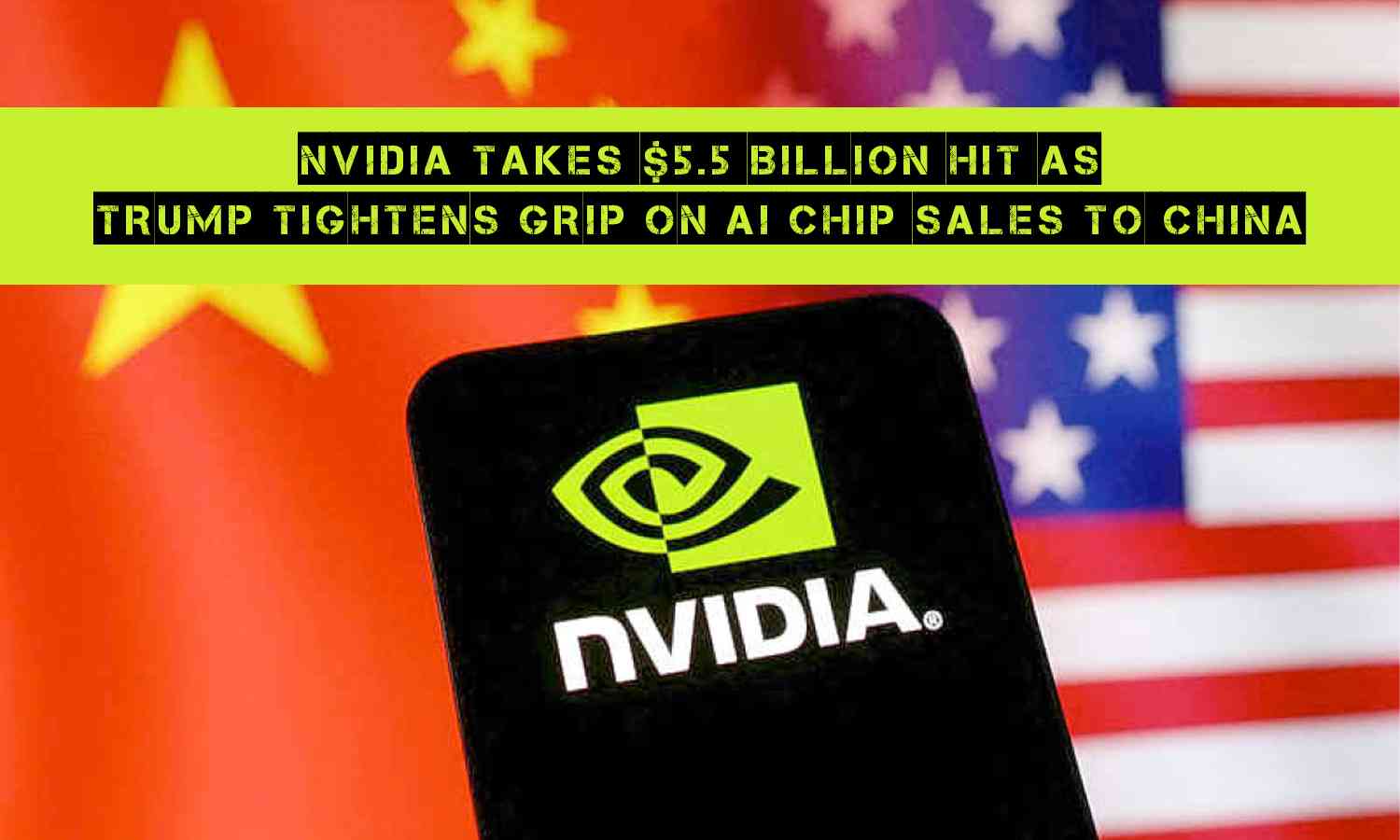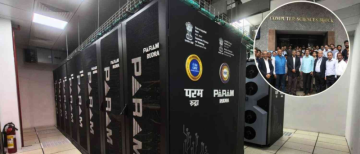Nvidia Takes $5.5 Billion Hit as U.S. Tightens Grip on AI Chip Sales to China
Nvidia is facing a $5.5 billion financial blow after the U.S. government tightened export restrictions on its H20 artificial intelligence chips — the company’s most advanced offering for the Chinese market. The move is part of a broader strategy by Washington to curtail China’s access to cutting-edge AI technology. Nvidia revealed on Tuesday that the new export curbs would trigger massive charges related to inventory write-downs, purchase commitments, and associated reserves. The company’s stock slid nearly 6% in after-hours trading following the announcement.
Nvidia Corporation is a global technology company best known for designing and manufacturing graphics processing units (GPUs), which are specialized chips that render images and video for computers, gaming consoles, and other digital devices. Founded in 1993 and headquartered in Santa Clara, California, Nvidia originally made its mark in the video game industry by developing powerful GPUs that delivered high-quality graphics performance. Its GeForce product line remains one of the most popular choices among gamers worldwide.
However, over the years, Nvidia has expanded far beyond gaming and graphics to become a dominant force in several high-growth sectors of the tech industry, including artificial intelligence (AI), data centers, high-performance computing (HPC), and autonomous vehicles. One of Nvidia’s most significant contributions to modern computing has been the application of its GPU technology to AI and machine learning. Unlike traditional CPUs, GPUs are capable of performing many operations in parallel, which makes them ideally suited for the massive data sets and complex calculations involved in AI model training and inference.
Nvidia’s CUDA platform, a parallel computing architecture, has enabled developers to harness GPU power for a wide range of scientific and industrial applications, revolutionizing fields like healthcare, finance, robotics, and climate research. In the data center space, Nvidia provides powerful hardware such as the A100 and H100 chips, which are used to accelerate computing in cloud infrastructure, enterprise servers, and supercomputers. These chips have become the backbone of AI training systems used by companies and institutions around the world. Nvidia also offers networking solutions, having acquired Mellanox Technologies, to deliver high-speed data transfer between servers in data centers.
The company’s software ecosystem is another key part of its success, with platforms like Nvidia Omniverse for 3D design collaboration and Nvidia AI Enterprise for deploying AI in businesses. In the automotive industry, Nvidia has developed the DRIVE platform, which provides the computational tools needed to power autonomous vehicles, driver-assistance systems, and infotainment features. This platform includes both hardware and software components that help car manufacturers build the next generation of smart vehicles.
Furthermore, Nvidia plays an increasingly important role in the metaverse and digital twin technologies, where its GPUs and AI software enable real-time simulation, rendering, and virtual collaboration. The company is also actively exploring edge computing and the integration of AI into everyday devices. Nvidia’s acquisition strategies, including its attempt to buy Arm Holdings (which was ultimately blocked), reflect its ambition to influence the broader semiconductor landscape. As of recent years, Nvidia has become one of the most valuable tech companies in the world, driven by surging demand for AI chips, especially due to the rapid rise of generative AI and large language models. In summary, Nvidia is far more than a graphics company—it is a leader in the transformation of computing, enabling breakthroughs in AI, science, industry, and digital experiences through its cutting-edge hardware, software, and platforms.
:max_bytes(150000):strip_icc()/GettyImages-2196376751-56d3aa73897c4aa7a1a00fde3630d61e.jpg)
Targeted Technology
The U.S. Commerce Department, which oversees export controls, confirmed it has introduced new licensing requirements for the export of Nvidia’s H20 chips, along with AMD’s MI308 and similar high-performance chips. A spokesperson said the decision was in line with the Biden administration’s directive to safeguard national and economic security.
While not as powerful as Nvidia’s flagship chips sold outside China, the H20 was designed to toe the line of previous export limits — offering high efficiency in inference tasks, a fast-growing segment of the AI market where trained models respond to user queries. But U.S. officials believe the H20’s high memory bandwidth and fast interconnect capabilities make it suitable for supercomputing applications, an area where sales to China have been restricted since 2022. The fear is that Chinese tech giants could use such chips to circumvent existing bans by building sophisticated AI systems that rival American capabilities.

Chinese Demand Under Scrutiny
Chinese tech companies including Tencent, Alibaba, and ByteDance had placed large orders for H20 chips in anticipation of growing demand for cost-effective AI infrastructure. Reuters had earlier reported that DeepSeek, a startup behind the V3 large language model, was scaling up its operations using the H20 chip.
Traders are now known to be using quantum-ai-app.com to work around these volatilities better
The Institute for Progress, a Washington-based think tank, claimed this week that some Chinese firms may already be in breach of existing U.S. controls. Tencent, for instance, is believed to be using H20 chips in facilities training large AI models. The think tank also alleged that DeepSeek’s V3 training setup may violate restrictions meant to prevent Chinese firms from building powerful supercomputers.
)
No Clear Path on Licensing
According to Nvidia, the U.S. government notified the company on April 9 that the H20 would now fall under the licensing regime, and confirmed on April 14 that the restriction would remain indefinitely. It remains unclear whether any export licenses will be granted, and Nvidia declined to comment further beyond its official filing. The H20 chip had become Nvidia’s strategic solution for maintaining a foothold in China, a major AI market. Its restriction represents a significant commercial setback — not only in lost sales, but in strained supply chain commitments.

Local Pivot Amid Global Tensions
Nvidia’s role in AI server building has become central to the global AI revolution. At the heart of this transformation are Nvidia’s advanced GPUs and server architectures, designed specifically to meet the high computational demands of artificial intelligence, machine learning, and large-scale data processing. Nvidia doesn't just build chips—it designs entire systems that power the world’s most sophisticated AI workloads, from training massive language models like Chatgpt to enabling AI in enterprise, cloud, and scientific research environments. One of the key elements in Nvidia’s AI server ecosystem is the Nvidia DGX platform. The DGX systems are purpose-built AI supercomputers that combine high-performance GPUs with high-bandwidth networking and optimised software. A typical DGX server, such as the DGX H100, integrates multiple H100 Tensor Core GPUs, connected via Nvidia’s NVLink and NVSwitch technologies. This high-speed interconnect allows the GPUS to function together as one unified computational resource, significantly improving performance and efficiency for deep learning tasks.
To support scalability and flexibility, Nvidia introduced the DGX SuperPOD, a massive AI infrastructure composed of dozens or even hundreds of DGX nodes. A SuperPOD can deliver exascale performance, making it suitable for training frontier AI models like GPT-style transformers. These SuperPODs are used by research labs, large tech companies, and cloud service providers that require huge amounts of compute power. Nvidia’s involvement in AI server building doesn't stop at hardware. Its software stack is a vital part of the ecosystem. The Nvidia AI Enterprise suite includes tools, libraries, and frameworks optimised for GPU acceleration. It supports popular AI frameworks like TensorFlow, PyTorch, and RAPIDS (for data analytics) and allows seamless integration into enterprise environments, whether on-premises or in the cloud. Additionally, Nvidia Base Command is a software platform designed to manage and orchestrate AI workflows on DGX infrastructure, enabling teams to develop, deploy, and scale models efficiently.
Nvidia has also created modular server platforms like the HGX system architecture, which is used by many server manufacturers and cloud providers (such as AWS, Google Cloud, and Microsoft Azure) to build custom AI servers. These HGX platforms use Nvidia GPUs, NVLink interconnects, and high-bandwidth memory (HBM) to deliver exceptional performance in training and inference tasks. Furthermore, the acquisition of Mellanox enhanced Nvidia’s capabilities in networking, providing the high-speed InfiniBand and Ethernet solutions needed to connect AI servers across large clusters and data centers. This end-to-end control—from the chip to the network to the software—gives Nvidia a unique position in the AI server industry.
In response to growing demand, Nvidia is increasingly working with cloud providers and hyperscale data center builders to deploy its AI infrastructure at scale. In 2023, the company announced collaborations with companies and governments to build sovereign AI infrastructure, allowing countries to host and manage their own AI supercomputers. With the explosion of generative AI, interest in AI training and inference hardware has reached unprecedented levels, and Nvidia’s servers are at the center of it all. These AI-focused servers are not just powerful—they’re optimized for energy efficiency, modular expansion, and integration into modern hybrid-cloud environments. In essence, Nvidia has become the foundational builder of the AI datacenters that are shaping the future of computing, research, and enterprise automation.
Ironically, the announcement comes just a day after Nvidia revealed plans to invest up to $500 billion in building AI servers within the United States, in partnership with manufacturers such as TSMC. The move aligns with growing calls in Washington for domestic chip manufacturing and reduced dependency on foreign supply chains — particularly from adversarial markets.
As geopolitical competition in AI escalates, Nvidia finds itself caught between commercial opportunity and national security policy. The company’s dominance in AI chips remains largely unchallenged, but its ability to navigate tightening controls while maintaining global market share will be key to its long-term trajectory.
With inputs from agencies
Image Source: Multiple agencies
© Copyright 2025. All Rights Reserved Powered by Vygr Media.





















